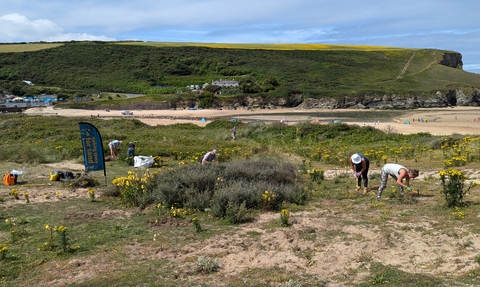
Making Space for Sand
A Changing Coastline
Beaches and sand dunes are important, highly mobile coastal features, which are constantly changing in response to short-term weather events and longer-term climate forces. Though beaches and dunes absorb some of the impacts of these events, human use and development of these environments has left some of them unnaturally constrained and in poor condition.
Without changes to the management of some beaches and dunes they risk being squeezed out, which could result in a more enhanced rate of erosion. This will compound the problem faced by landowners and communities located behind them.
The Making Space for Sand Project aims to provide a better understanding of the problems associated with sea level rise and coastal change, encouraging a more sustainable use of the coastal fringe and supporting a more natural, ecosystem-based approach to coastal management.
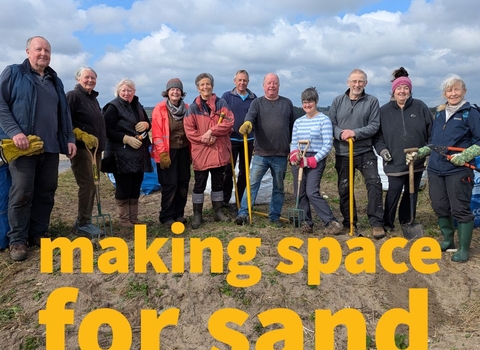
A Partnership Project
Cornwall Wildlife Trust are one of five project partners working on this DEFRA-funded project, who are all contributing towards the project aims in various different ways.
Cornwall Council are leading on the project delivery, pulling together work from all partner organisations, including Cornwall Community Flood Forum, University of Plymouth and South West Coastal Monitoring. Cornwall Wildlife Trust’s work is largely focused on the project outcome: “Maintain and restore healthy, biodiverse coastal dune systems that are less vulnerable to sea level rise and coastal change”.
Our work on the project
A particularly important element of Cornwall Wildlife Trust’s work is the ‘empowerment of communities’ to make dunes more robust and biodiverse. This work consists of three main strands:
- Supporting and/or re-invigorating existing beach groups
- Encouraging the formation of new beach groups
- Integrating interested groups into Cornwall Wildlife Trust’s Your Shore Network.
We are employing a ‘Community Organising’ approach to this work, encouraging groups to lead, with Cornwall Wildlife Trust playing a more supportive and facilitatory role. This is about enabling groups to function in an independent manner, giving them the best chance of continuing post-project.
This is being achieved a via a project-funded Community Engagement Officer, who is working with a number of volunteer groups and land owners across Cornwall. The focus is on delivering practical ‘hands-on’ volunteer tasks, which aim to improve the ecological condition of the dunes by doing things like removing invasive species of plants or helping dunes to regenerate in some areas.
Cornwall Environmental Consultants (CEC), the commercial arm of Cornwall Wildlife Trust, are also working on Making Space for Sand. Their work is being delivered in three distinct stages over the course of the project:
- CEC work conducted in stage one of the project included analysis of dune systems at the 40 project sites around Cornwall - involving ground truthing, and the identification of sites where the most could be gained from addition ecological assessment.
- Stage two produced ecological assessments for 23 of the project sites. The freely available reports identify different habitat types, highlight notable species and record invasive species found at each site. These reports create an important baseline of information that can be used in the future to monitor how dune habitats are changing.
- Finally, stage three is about producing Beach Dune Management Plans for 10 of the project sites. These plans will review the current health and condition of these dune systems and consider ideas for their improvement. The plans will pull together all of the learning we have gained throughout the project and provide restoration objectives that guide landowners and volunteer groups in their efforts.
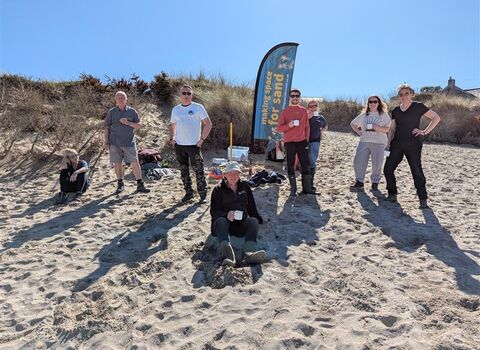
Get Involved
If you want to get involved with Making Space for Sand then please check out the Facebook pages of the different groups we’re working with below and contact them directly for volunteer opportunities:
Friends of Par Beach
Mounts Bay Marine Group
Friends of The Towans
Porthtowan Dunes Community Group
St Agnes Marine Conservation Group
Friends of Fistral Dunes
The Dunies (Mawgan Porth)
Beach Guardian
Widemouth Task Force
Bude Dunes Group
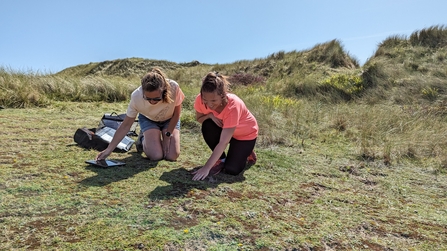
CEC ecologists surveying the sand dune
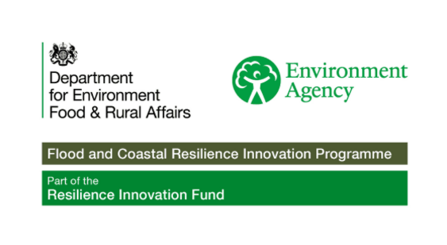
This project is funded by Defra as part of the £200 million Flood and Coastal Innovation Programme, which is managed by the Environment Agency. The projects will drive innovation in flood and coastal resilience and adaptation to a changing climate.





